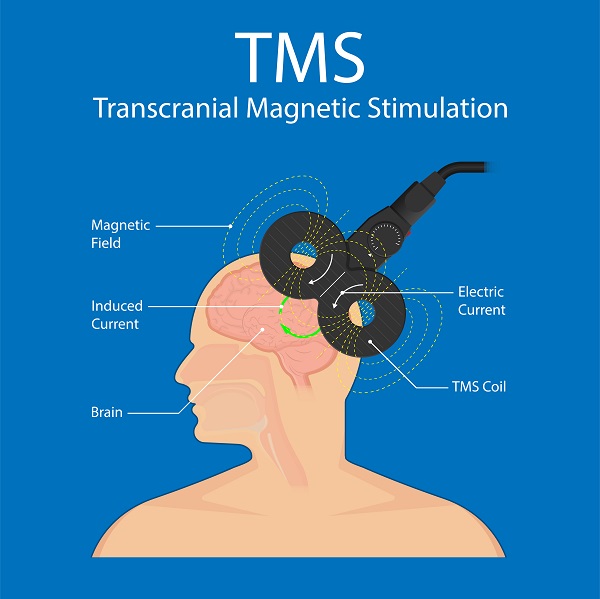TMS – Transcranial Magnetic Stimulation Depression Treatment

Transcranial magnetic stimulation treatment — otherwise referred to as TMS — can be a great way to find relief from chronic depression. Anyone who struggles with depression and has not found relief through talk therapy or medication may be able to benefit from TMS treatment.
What is TMS?
TMS is a form of brain stimulation used by psychological professionals to treat patients with chronic or severe depression that does not improve through other means of treatment. TMS is non-invasive, and the procedure itself usually does not take more than an hour, although it is most often necessary for the patient to go through multiple treatment sessions to see effective results.
How does TMS work?
During a TMS session, magnetic coils are placed on the patient’s head in a strategic manner, and magnetic pulses are delivered in an effort to stimulate certain areas of the brain. The stimulating pulses are continually switched from on to off, in order. The idea behind TMS is to stimulate regions of the brain that are less active and may be contributing to the patient’s depression. Studies are still ongoing as to how effective TMS is in treating depression, but many patients find it to be effective in treating their symptoms and improving their overall mood, although for many, the results are not permanent and additional TMS procedures may be needed in the future.
Why might someone need TMS?
TMS is intended to treat depression by improving the overall mood of the person and helping their brain be more active. It is not typically a primary form of treatment, however, and it may only be recommended in the event the patient does not find relief through talk therapy or anti-depressant medication. However, those who have struggled with depression for an extended period of time despite other treatment methods may be able to benefit from TMS treatment. TMS is only recommended after evaluation by a psychiatric professional and diagnosis of depression or a related condition.
Benefits of TMS
There are many benefits to TMS treatment when it is effective. Perhaps the most notable benefit is the relief from depression patients are often able to find through TMS when other forms of treatment do not work. TMS has improved the quality of life in patients, and many have reported feeling better daily, being more proactive in doing the things they love and having a more positive outlook on life in general. Although studies are still ongoing, there has been some evidence to suggest TMS can also help with issues like obsessive-compulsive disorder and generalized anxiety, as well.
Consult with us
Everyone should be able to feel good each day and not have to deal with severe depression, and in the event that traditional treatment methods fail, transcranial magnetic stimulation treatment can work to improve the quality of a person’s life and help them to feel happier. If you struggle with depression and have not found relief through medication or talk therapy, then consult with us today and find out whether or not transcranial magnetic stimulation treatment is right for you.
Request an appointment here: https://nycpsychiatricassociates.com or call NYC Psychiatric Associates at (917) 391-0076 for an appointment in our New York office.
Check out what others are saying about our services on Yelp: Read our Yelp reviews.
Related Posts
While there is no cure for many long-term behavioral disorders, they may be successfully controlled with the right combination of therapy and other treatments. Behavioral issues such as obsessive-compulsive disorder, attention deficit hyperactivity disorder, and addiction disorders are prevalent nowadays.While there has been a lot of study into what causes behavioral disorders, including diverse fields…
Depression treatment can vary from patient to patient. However, all psychiatrists approach each patient with some basic techniques. These strategies can guide you through your depression treatment. Here are the details on how each mental health provider can guide you through your condition.The psychiatrist can prescribe antidepressants. These drugs can help correct the uneven chemistry…
Professional schizophrenia treatment is necessary due to the complexity of the mental health disorder. Psychiatrists characterize it as a range of hallucinations, delusions, jumbled thinking patterns, and sometimes a loss of emotional resonance or expressiveness. These are just some of the symptoms that make trying to manage the disorder independently nearly impossible and dangerous.Before developing…
Treatment-resistant depression is a leading reason patients seek antidepressant alternatives, but it is far from the only reason. Though typically a first-line treatment, antidepressants are not the only option and are not right for every patient. The following are some reasons these drugs may not work for you and alternative therapies a psychiatrist might recommend.In…


